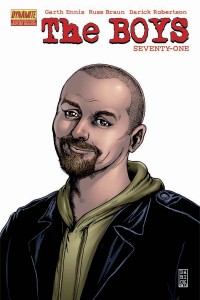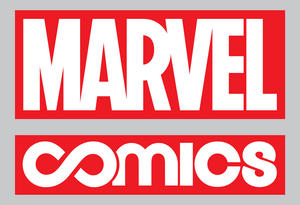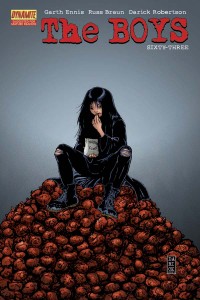 EDITOR’S NOTE: In a world where costumed heroes soar through the sky and masked vigilantes prowl the night, someone’s got to make sure the “spoilers” don’t get out of line. And someone will.
EDITOR’S NOTE: In a world where costumed heroes soar through the sky and masked vigilantes prowl the night, someone’s got to make sure the “spoilers” don’t get out of line. And someone will.
I’ve read The Boys #71 a few times now, and I keep going back and forth on how I feel about it. Because it’s operating on a couple of different levels, and one of them is on the character level. At this point, we’ve spent six or seven years with Wee Hughie and Butcher, and what with this being the second-to-last issue, writer Garth Ennis needs to wrap up the relationship between those two guys, which has gone through older brother / younger brother, to stern mentor / insecure student, to mortal enemies. And this issue accomplishes that, in the standard Garth Ennis fashion of violence and manly bonding. Which is always interesting to read, if it doesn’t bear a lot of resemblance to any male friendship I’ve ever been in; I find we tend to resolve our differences with hard liquor , repeat viewings of Caddyshack and the copious application of the word “homo.”
However, on another level, when Ennis debuted The Boys back in 2006, he promised that the series would “out Preacher Preacher.” And now as we wind into the final couple of issues, it’s becoming apparent that The Boys is certainly following the narrative structure of Preacher‘s conclusion, with two close friends battling each other to a standstill, before coming to a final reconciliation, concluding with the apparent death of the “bad guy,” who started out as the “good guy’s” closest friend. With all of it happening in the shadow of an American national monument, with the relationship between the “good guy” and his estranged girlfriend unresolved and hanging in the balance. From a structural standpoint, the main difference between the second-to-last issue of Preacher and the second-to-last issue of The Boys is that Cassidy committed suicide by sunlight and Butcher did it via rank, threatening douchebaggery.
Maybe they should’ve just watched Caddyshack.


 Podcast RSS Feed
Podcast RSS Feed iTunes
iTunes Google Play
Google Play Stitcher
Stitcher TuneIn Radio
TuneIn Radio Android
Android Miro Media Player
Miro Media Player Comics Podcast Network
Comics Podcast Network